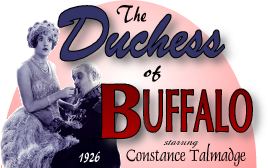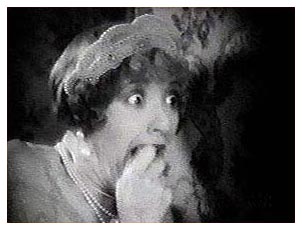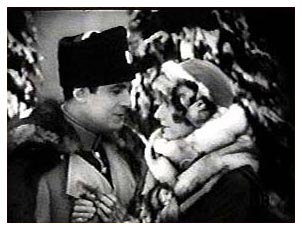

It's such a shame that there aren't more of Constance Talmadge's films available for viewing today. However, two excellent examples that exhibit well her gifts as a comedienne are available "The Primitive Lover," which is also reviewed on "Silents Are Golden," and "The Duchess of Buffalo."
"The Duchess of Buffalo" fits into the popular
genre of bedroom farces which were so prevalent in the twenties.
It also satisfied another  popular interest of
the time. As Richard Griffith, Arthur Mayer and Eileen Bowser
stated in their huge volume, The Movies (Simon & Schuster,
1957), movie-goers "loved to picture the lives led by European
nobility as a combination of luxury and depravity," which
this film does . . . in a comical way, of course.
popular interest of
the time. As Richard Griffith, Arthur Mayer and Eileen Bowser
stated in their huge volume, The Movies (Simon & Schuster,
1957), movie-goers "loved to picture the lives led by European
nobility as a combination of luxury and depravity," which
this film does . . . in a comical way, of course.
We are introduced to Talmadge's character, Marian Duncan, with the intertitle "Marian Duncan danced in America without avail. Then she tried Russia without a veil and OH BOY-OVITCH!" This pretty much sets the tone for that mild touch of "risqué" which is prevalent throughout the film. Not that Duncan is pictured as any more than moral, faithful and upright - it's just that her dancing for the Russian elite involves the removal of several veils she wears on her body. The film opens with this dance being viewed very nervously by her lover, Lt. Vladmir Orloff. However, we don't get to see the complete dance because Orloff can't stand the leering of the men in the audience. He rushes to the wings of the stage and demands that Duncan NOT remove her last veil! An example of some of the delightful title writing in this film comes next. Duncan and Orloff are backstage and he asks forgiveness for his impulsiveness and says, "I just got excited." Duncan replies, "You must pardon me, dearest for having excited you."
One of the "leering" men in the audience, however, was the Grand Duke Gregory Alexandrovich who, in spite of his wife's disapproving looks, was doing little to contain his excitement. Edward Martindel's portrayal of the Duke is near perfection and ranks second only to the beauty and charm of Constance Talmadge as to why this film is so good. He can be stern and imposing at one time then come across like a devilish little boy the next. One of his best moments in the film is when he arrives at Duncan's apartment. The maid lets him in, but Duncan thinks it is Orloff who has arrived. She hides behind a dressing screen to tease her lover by reaching out from under the screen and pulling his pants leg and then reaching through an opening to caress his face. All the while, she thinks it is Orloff on the other side of the screen that is, until she feels his beard and mustache. Martindel's expressions are that of a little boy who is shy yet enjoying himself more than he ever has. Talmadge's performance at this point, as it is throughout the film, is superb, as well. The look of puzzlement then fear when she realizes this is not her lover is excellent comedy not overplayed, but certainly not low-key, either.
As with any really good comedy, there must be a measure
of drama, as well. In "The Duchess of Buffalo," we are
introduced to Duncan and Orloff as two young people who are very
much in love and have the world at their feet. She is a successful
dancer; he is a successful officer in the Russian military. They
both are anxious to get married, and the only detail which much
be dealt with is to get the Duke's approval as all members
of the Russian military must do if they wish to marry. The Duke
does not give his approval, and we share  Orloff's
dilemma about what to do. He makes the most obvious choice
he asks that his resignation from the military be accepted. The
drama goes a step further, however, when the Duke has him placed
under house arrest for three days to "think over" his
rash decision. And there is one more added element to this
if he breaks house arrest, he must be shot!
Orloff's
dilemma about what to do. He makes the most obvious choice
he asks that his resignation from the military be accepted. The
drama goes a step further, however, when the Duke has him placed
under house arrest for three days to "think over" his
rash decision. And there is one more added element to this
if he breaks house arrest, he must be shot!
As with most farces of this type, there must be a comedy of errors misunderstood words, mistaken identities, etc. "The Duchess of Buffalo" handles this well when Duncan is mistaken for the Grand Duchess. Chester Conklin is excellent as the flustered hotel manager who, in his excitement about the coming of the Duchess, throws out the royal carpet for Duncan. She, of course, does not realize why she is being treated so royally until much later then she must maintain the ruse to protect Orloff. Complicated? Not really. Director Sidney Franklin handles the storyline well the film flows smoothly, characters are well-defined, nothing is so far out that it can't be believed, and the performances of all the actors are great!
'In the final third of the film, the pace is increased considerably, and, as the saying goes, "there's never a dull moment." Lots happens to keep us gripping the arm of our chair the Duke discovers Duncan is posing as the Duchess (to his delight), he escorts her back to her room and then refuses to leave, Orloff is hiding in the room and believes she is really interested in the Duke, the Duchess arrives and the Duke must hide, and on and on. Still, too, the question must be answered as to what action the Duke will take against Orloff for breaking his house arreat once he's discovered!
Tullio Carminati gives an excellent performance as Orloff, and it's too bad he wasn't in more silent films. Although he has over 30 films to his credit, only six of them were silents. "The Duchess of Buffalo" was his third.
Rose Dione does well as the no-nonsense Duchess who seems to know her erring husband all too well. She may be best remembered as Madame Didier, the owner of the laundry in Mary Pickford's "Suds."
copyright 2001 by Tim Lussier, all rights reserved
Return to "The Duchess of Buffalo" page